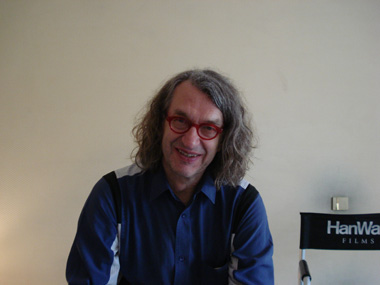
"You're pressing too hard," Wim Wenders
counseled me, as I tried to take a picture of him.
"If you press lightly and don't have the camera shake,
it will come out fine."

I welcomed Wim Wender's guidance on taking
a good steady picture, especially since we had just
discussed his new film, Palermo Shooting, where a
photographer comes to terms with the fact that you
cannot take a steady picture: i.e., one that lasts.
The photographer, played by singer Campino, travels to
Italy, in the tradition of Romantic artists, such as
Goethe, to face questions of death, not only his own
(he is chased by an arrow-shooting Death character, à
la Ingmar's Seventh Seal devilish chess player), but
of time in general. Nothing lasts, muses the
photographer, seeing the photograph itself as a
mortuary artifact.
I also welcomed the film itself, a rather
lonely experience, as the majority of critics at Cannes
found Wender's filmic encounter with death a
pretentious "embarrassment," a washed-over
Antonioni/Bergman homage (a point hammered in by the
ending credit dedication to "Ingmar and
"Michelangelo."). And yet, this movie thankfully
reminds us less of Wenders' recent unwatchable sprawls
and more of the early powerhouse Wenders films, such
as Alice in the Cities and Wings of Desire, where
a voice-over ponders philosophical issues to the sound
of music.
Indeed it was the rock score of the film
that enchanted me, this along with the thoughtful
existential musings. Granted, the story per is
rehashed, the drama contrived, but to watch a
discussion with a white-masked death set in an odd
Italian palazzo, while journeying into the chords of
Iron and Wine, Thom, and Nick Cave, is not such a bad
experience.
Wenders quickly agreed that the "true
model" of his film was rock and roll. Sitting rigidly
in a chair, looking down at his lap in serious
contemplation, his red glasses framing his eyes, he
lauded the importance of music: "I feel movies don't
dare deal with such existential issues the way rock
and roll does. The generation of 1960s artists, such
as Van Morrison, inspired me to trust my creativity as
they did. I would never have become a filmmaker
without the model of rock and roll." He wrote the
script in a small village in Sicily, over coffee every
morning, with the music in mind.
And why is Wim Wenders now confronting the
issue of death?
"I feel like everyone else," he confided.
"That I am constantly running behind my own time. I
feel my life is passing by without having a grasp of
it. Very few people do the things they want to. A
lot of us lose that capacity to distinguish what is
essential, to not just be concerned with formulas and
things that don't matter much."
He is also concerned with how we can
retain our memories. Even the concept of mortality
is mortal, susceptible to change, conditioned by where
we are in history: "The notion of mortality is
changing radically in our times. I go home and find
drawings and notebooks of my childhood, and even
bundles of love letters that my father wrote to my
mother during the war. Children today will not have
that experience: they do not keep their emails. All
will be gone. We want to store everything, with
computers, but we really don't. Today the act of
mortality is erased."
And yet the climatic scene of the movie is
when Death, disheartened because of his "bad image"
(nobody seems to like him), protests that he is
unfairly maligned, not seen for who he is, a lover of
life. He urges the protagonist to hug him.
What does it mean to "hug death"?
"It is proof that he has lost fear. He
trusts Death."
Why would anyone not fear
death -- especially Wenders who wrote this filmic
journey into mortality and its creepy punchline:
"Death is an arrow coming from the future right at
you"?
Wenders calmly explained his conviction:
"Everyone I have ever met who has faced death has said
they had no fear. I myself faced death for half an
hour, and had the same experience. No fear. Just
peace and great freedom. Light and great beauty.
Death will not be at all scary. Our preoccupation with
fear must come from somewhere else."
